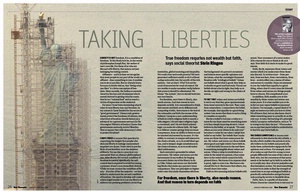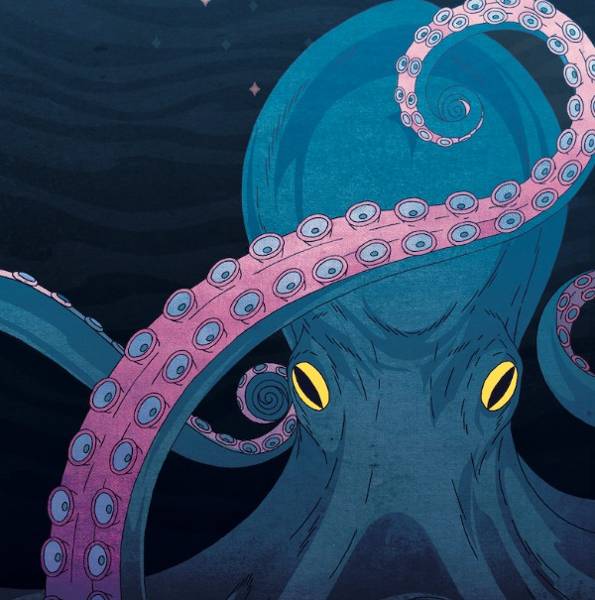Liberty is not freedom. It is a condition of freedom. To live freely is to be, in the words of philosopher Joseph Raz, the author of one’s own life. For those of us who are blessed with liberty, that means not just indulging but taking control.
Affluence – and it is time we recognise that most people in our part of the world are affluent – does something to you: it enables you to do as you like. But we already know, because Aristotle told us, that “doing what one likes” is a false conception of freedom. More recently, the Indian economist Amartya Sen has said of someone who is merely shrewd in getting what he wants that he is a “rational fool” and as much a victim of repression as the enslaved.
 For years I have been examining what it takes to turn liberty into real freedom. In my research I have hunted for the secret of “good government”. Democratic governments protect the freedoms of citizens, but what kind of freedom should democracy advance? As a government servant (in the Norwegian Ministry of Justice) I know that governments seriously restrict liberties. How to square that with democracy’s duty to protect freedom?
For years I have been examining what it takes to turn liberty into real freedom. In my research I have hunted for the secret of “good government”. Democratic governments protect the freedoms of citizens, but what kind of freedom should democracy advance? As a government servant (in the Norwegian Ministry of Justice) I know that governments seriously restrict liberties. How to square that with democracy’s duty to protect freedom?
I have tried to answer this question by unpacking the insight that people who demand liberty to indulge unexamined impulses are slaves. I have tried to put the flesh of real freedom on to the skeleton of liberty. For me this is a practical concern more than an abstract philosophical one. After liberty, the second condition of freedom is control, specifically the self-control that is required to avoid becoming a prisoner of one’s own immediate desires. While we have created the condition of liberty – if not for all for the majority – we have failed to understand the second condition of freedom: the need to develop self-control which might enable us to use our liberty to address our pressing problems: social fragmentation, global warming and inequality. We could even end world poverty! We have generated sufficient wealth to do it without eating noticeably into the wealth of the rich nations – but we don’t. Why? It is not for want of means but for want of control. We are unable to make ourselves really believe that poverty should be eliminated. We blame “the system”, but we should look into our own hearts.
For freedom, once there is liberty, also needs reason. And that reason in turn depends on faith. It is conventional to think that reason and faith are in different and competing worlds, that reason is the tool of the rationalist and faith the excuse of the believer. I propose a new understanding of faith in which religious faith is merely a subcategory. I do not reject religious logic as irrational, and I do not think rational logic can make do without faith. My logic is as follows: reason springs from an inner competence, from an ability to listen to and be touched and moved by reasons. It’s the ability to restrain: to temper self-interest in the choice of ends, so as to avoid blind egoism, and to temper single-mindedness in the choice of means, so as to avoid unbridled ruthlessness.
Such restraint is grounded in values and norms. My values and norms are the instruments in my toolbox for forging reasoned choice out of the liberty to do as I like. Values and norms are the building blocks that make up a person’s inner competence. They are principles or higher-order rules that make themselves felt from the background of a person’s awareness and inform more specific opinions and decisions, what the sociologist Raymond Boudon calls “axiological beliefs”. Values are beliefs about what is good; they help us to decide on good and bad ends. Norms are beliefs about what is right; they help us to decide on right and wrong in the choice of means.
To say that values and norms are beliefs is not to say that they grow spontaneously from inner sources in the soul. They come from somewhere. I cannot form the belief, for example, that equality is a good thing unless I am aware that there is such a thing to consider as equality.
But for a belief to become a value or a norm for me there must be something more to it than simply knowing about it. I must believe in the belief, so to speak. “Do unto others as you want others to do unto you” becomes a value for me when I adopt that belief as my belief. The beliefs that I make mine are those that have some power for me. My values and norms are those beliefs about good and right which I have faith in.
I call this faith because in the end there is something intangible about values and norms. When a value is established as a value in the mind of a person, it has some force in her mind which cannot be fully pinned down. She knows it to express what is good, right or even true. She knows she should live by it. She knows that others, too, should share that value.
Faith in this meaning infuses beliefs with power. Your awareness of a norm makes of it a reason for you to think or do as it says. Your faith in it starts to make it a good reason.
Faith, firstly, separates those values and norms which you make yours from those you discard. In various ways – from parents, from teachers, from conventions, from laws – society offers you a menu of values and norms to consider. Some recommend to you the belief that equality is a good thing, others that it’s every man for himself. Even values and norms are things people have to choose, if in complicated ways.
In addition, faith enables you to live sensibly by those values and norms you make yours. It is what enables you to do in fact as your super-beliefs recommend in theory. For example, a speed limit of 70 mph on motorways tells you how to drive. We all know that, but we also know that it takes something more to actually do as the rule says. It takes the backing of a principle which I accept as authoritative, such as “it is wrong to not obey the law”. What makes me accept that super-belief as authoritative is that it is one I have faith in.
The inner competence to reason rests ultimately in this elusive faculty of faith, a faculty which enables the person to actually believe in his beliefs and practically make them authoritative signposts for his opinions and actions. For example, most of us today accept that it is wrong to treat people differently because of the colour of their skin, but the awareness of that norm needs to be backed up by faith in order for us to really stay clear of racial prejudice and discriminatory action. We need something to resort to in order to find the strength of conviction to accept axiological beliefs as practically authoritative and get beyond only paying lip service to laudable ideas.
Faith, then, is a quality of character. Where character comes from is not easy to say, but a part of the answer must be that it is learnt. We need to be taught not only the facts of the world but also about good and bad, right and wrong. Freedom in the sense of being able to live a life that is one’s own life rests on learning, on what the Germans call bildung.
If faith starts to make a belief a good reason for choice, how can I know that what faith puts to me as a good reason really is a good reason? Blind faith is not the stuff of free women and men.
The alternative to blind faith is evidence-based faith. As a rational person you want to invest faith in those values and norms that there are good reasons to have faith in. Resort to evidence is the sensible way to decide which, in the larger menu of potential values and norms, to make yours.
Evidence comes in many forms. In a scientific age we want to trust science, but scientific evidence about issues of human passion is thin on the ground. The law tells us about right and wrong, but the law can be mistaken. Prime Ministers and Archbishops tell us what to do and how to live, but trust is thin. There is evidence out there but it is not complete, not objective and not easy to make sense of; it is of many kinds and from many sources, scattered and often contradictory, always ambiguous.
Persuasive evidence is tested evidence. Is it for example true that “the nuclear family” is the best basis for raising children? I can try to find the answer in my own experience, but I will know that to be a flimsy basis. I am better off by asking others: this is how I’m inclined to see it but what is your experience? If I ask several others and keep an open mind I am on my way to finding a safe opinion. I may ask experts or people I trust. Or I may say, let’s sit down and discuss and explore this difficult question carefully.
In the end evidence is tested by conversation, exchange of information and opinions and discussion: in the philosopher Jürgen Habermas’s language, by deliberation. This is no foolproof method. Its quality depends on what information is available and our inclination and ability to deliberate openly and honestly. But it is the best we have. Tested evidence is evidence that has survived rational deliberation.
Liberty is a strange commodity. Not having it is tantamount to social death, but when you have it you find that it does not do much for you. If you do not use it well, its temptations strike back at you and you find yourself a rational fool living under a dictatorship of desires you just happen to have.
To overcome this we need to develop the habit of restraint. But where does this come from? It is something that is fostered in institutions, most importantly in the families in which children grow up, in the schools in which they continue to learn, and in political institutions of deliberation. Institutions are the settings that protect us from isolation and loneliness, in which we can hone our beliefs about good and bad and right and wrong, and in which we find what I call social anchorage. A society of not just liberty but also freedom is a society of strong institutions in which people have belonging and live in community with each other. We little human beings are not just individuals, we are also social animals. For freedom, it is necessary but not sufficient that we have liberty. We must also invest in the institutions we need to live together with solidarity, civility and good sense.

